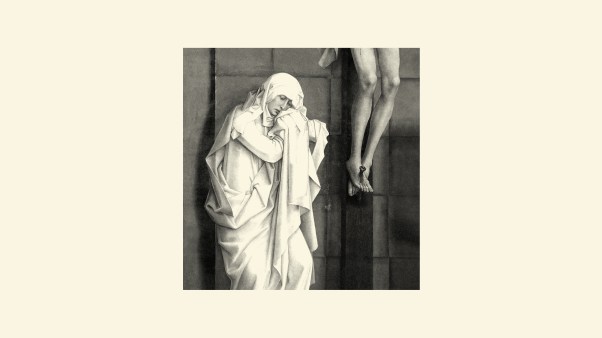At the center of the remarkable montage near the opening of Pixar’s Up stands the sorrow of infertility.
On one side lie the joys of a budding marriage, and on the other the delights of its twilight. In the hour of crisis, Carl sees Ellie sitting in the garden facing the sun with a forlorn look, feeling the devastation of their joint barrenness. Neither character speaks throughout the montage, but here their silence is particularly apt: the wordlessness of grief weighs heavily upon them, and upon us. Relief begins when Carl, who is by no means immune to their sadness, places Ellie’s “adventure book”—which has many more pages in it for them to fill—in her lap. It is the most beautiful depiction of infertility I know of; it is among the most tender five minutes of film I have ever seen.
But the adventures Carl and Ellie are given in the latter half of their lives are not the grand, exotic drama they had wanted. They hoped to someday live on top of a waterfall. Instead, car tires go flat, the roof needs replacing, and bones are broken. At every turn, the ordinary challenges of living in this world prevent them from pursuing the dreams of their youth. Yet if their adventure book is incomplete when Ellie dies, it is not empty; we glimpse the fullness of their love and feel like it is enough. The sadness at their separation stems not from their inability to live out their dream, but from the reality that they are no longer together.
While the montage is widely regarded as one of the most moving parts of the film, it almost failed to make the final cut. Director Pete Docter said the studio was leery of showing their infertility because it was “going too far.” But the filmmakers had no real choice: Carl and Ellie’s lives lacked emotional depth when their pain was removed. The audience would not care for them quite as much if it were gone, and the rest of the plot would not pack as much punch. Carl’s subsequent adventures include making friends with an eight-year-old who is reminiscent of Carl himself as a young boy, a relationship that would not be nearly as interesting without knowing their infertility. And so the sweet and sad montage stayed, infertility and all.
Beyond sensitivity
It is easy to cast a pall over our society’s ritual celebrations of family and fertility by offering cautions that not everyone shares in the fun the same way. Pleas to remember the pain of the infertile are common these days. Such exhortations for care and concern certainly have their place, as infertility can be a heavy, unwelcome, and suffocating burden. It is impossible for those who face it to avoid the pervasive reminders that some of their deepest desires are frustrated.
Infertility reminds the church that the satisfaction marriage offers is given ultimately not through childbirth but in the resurrection from the dead.
But such cautions must be more than trigger warnings that one person’s joy might exacerbate another person’s sorrow. If we offer nothing beyond these admonitions, our view of both fertility and infertility will be too impoverished, too weak. We will obscure the gifts such couples have for each other. The infertile offer the church far more than a shadow over its joy at the gift of life. They ensure through their mourning and laments that biological children are not reduced from gifts to idols. Their presence helps the church learn endurance in the face of what feels like the endless rejection of our deepest earthly desires. Those who are infertile and have allowed hope to grow within their soul orient marriages toward their true end, the eschatological kingdom of God, in a way that not even the celibate can. All these are facts, and as the novelist Charles Williams suggested, all facts are facts of joy. We cannot excuse the fertile from mourning with those who mourn. But neither can we excuse infertile couples from rejoicing with those who rejoice. Both must stand or fall together: We need the joy and the sorrow, both, to illuminate and interpret the other. This is the way the tragic glory of the gospel takes embodied form in our churches.
It is no secret that procreation structures the lives of infertile unions as much as any couple’s. Such an absence will almost certainly be met with tears, as it should be. Sometimes it is accepted with a quiet resignation. But it may also become a gift for the infertile couple, and when the hours of sadness and emptiness finally grow thin, may be adopted as a vocation, a way of bearing witness to goods that the church risks forgetting otherwise.
Question Assumed Answers
Couples have sought medical and technical interventions to help them procreate since at least the time of Rachel, who wanted mandrakes from Leah to help her conceive (Gen. 30:14). Yet there is no doubt that the success of in-vitro fertilization (IVF) and other treatments has raised the stakes for couples who are infertile, rendering the default path one of aggressive intervention—hormone injections, the harvesting of eggs, endless semen samples. Our newfound ability to create babies in the lab generates the expectation that infertile couples will.
The widespread and uncritical adoption of reproductive technologies among evangelicals has thus had the effect of rendering infertility even less visible among our communities than it would otherwise be. The lovely montage from Up could hardly be set in our own time and might not make sense to our grandchildren. The film’s plot turns on what is rapidly becoming a relic of a bygone era. The sorrow that marks infertility is overcome these days not by taking up an adventure book, but by constant visits to fertility specialists, hormonal treatments, surgeries, and (almost literally) whatever else the exhausting regime of “making” a baby in the modern era demands. Many of those efforts are understandable—Rachel sought her mandrakes, remember. But they also can consume the infertile couple.
Within the church, the pressure to have children is compounded by the rapidly expanding adoption movement. The correlation of infertility and God’s calling to adopt is sometimes left implied, but is more frequently overt and direct. But as writer Kevin White has observed, there is more good that needs doing in this world than each of us are commanded to accomplish. The general exhortation to love one’s neighbor may sometimes require a couple to adopt, but sometimes it may not; infertility does not on its own make adoption obligatory. In fact, infertile couples might be uniquely at risk of treating adopted children as a means of fulfilling their own frustrated desires for a biological child, reducing them to an instrument of the parents’ happiness. It is tempting to view adoption as a path toward alleviating our own suffering and emptiness, rather than an expression of charity toward the child. In its ideal form, the call to adopt expands the horizons of a couple’s imaginations for their lives. Yet in its institutionalized expression, it risks reducing adoption to an obligation upon the infertile, which would undermine its gratuitous character.
Which is not to say that those who choose medical intervention or adoption are selfish. By no means! But like any good, they can tempt toward idolatry, transforming human life and God’s graciousness from a gift to an earned reward for years of hard work and pain.
The church might want to resist the pressure for marriages to have children through any means possible, and hold on instead to infertility as a unique and irreplaceable witness within its inner life. It is easy to look at such sadness and think that if we can avoid it, we are best off doing so. But the church might lose something crucial if there are no childless marriages in our midst. That we can make children through IVF does not entail that we should. But widespread acceptance of IVF means that we risk forgetting both the struggles of permanent barrenness and its unique virtues. The special vocation of the infertile means recalling the church to goods that our technologically sophisticated world has forgotten and obscured.
What Infertility Offers
What goods might infertile couples bear witness to? In his magisterial work of moral theology, Resurrection and Moral Order, Oliver O’Donovan suggests the early church construed “marriage and singleness as alternative vocations, each a worthy form of life, the two together [composing] the whole Christian witness to the nature of the affectionate community.” The one bore witness to the original goodness of creation through sanctioning sex and procreation, while the other looks forward to the glory of the eschaton. But neither captures the distinctive contribution that the barren make to the church’s moral witness on marriage.
One aspect of the vocation of the infertile is that the frustrated willingness to bear children reminds the church that our children are gifts from Providence. The glad assumption of sorrow and lament—a paradoxical, but necessary form of life—by those who are barren testifies within the church (and beyond) that the power to make new life comes from God and not from ourselves. Children are not made; they are given. Man and woman throw themselves upon the grace of fate in trying to bring a child into the world. The emergence of new human life is a miracle, as the infertile well know.
Infertility also expands the church’s moral imagination, and reminds us that the satisfaction marriage offers comes ultimately not by childbirth but in the resurrection from the dead. The sadness that often marks infertile couples is fertile soil in which a deeper and more pervasive joy in our resurrection can take root. Those who groan in their infertility, who know only the vanity of striving but never encounter the gladness of birth, participate in the groaning all creation suffers as it awaits the revelation of the sons of God (Rom. 8:22). Those who are infertile remind the church that even its songs of triumph must sometimes be sung in a minor key. They bear a cross, that others may know the source and end of their crown. They remind the church that the joy of resurrection sits alongside a painful, frustrating “not yet,” pleading patience and endurance and good cheer in the face of hardship. They thus bear witness to a form of marriage characteristic to a fallen world, a form of marriage under judgment—and grace.
We need visions of paternal and maternal love that take their form beyond the walls of the family.
More practically, though, infertile couples help expand the scope of familial love. Like adoptive couples, their ongoing hope bears witness to the church that the most basic character of parenthood is not biological. But unlike adoptive couples, the infertile must extend their marital and parental love outside the family itself. Maternal and paternal love are not given only to mothers and fathers, biological or otherwise. They are the mature form of married love, and thus are available to any couple, fertile or not. The glory of the union of man and woman can be given to others through non-biological, non-procreative means—as Carl from Up discovers as he develops a fatherly affection for his young friend. Infertility does not free a couple from the duty and delight of learning the love mothers and fathers know so well.
But the infertile also uniquely challenge the church to remain vigilant against a natalism that reduces marriage’s perfection to the presence of biological children. The celibate stand outside marriage, testifying that it is not necessary for the Christian. But the infertile stand within marriage and announce the eschatological character of the children who are given to it. As gifts from God, children are to be returned to God. The non-familial expression of maternal and paternal love thus orients marriage toward its eschatological perfection, offering both a yes to marriage itself and a no to limiting marriage’s point to biological children.
The Child for the Childless
Christianity does not merely admit the tragedy of infertility but positively sanctions it. It knows the tragedy of infertility as well as it knows the tragedy of the Cross. Those whose marriages are infertile should drink the cup of mourning to its final drop; they have been authorized by their Savior to do no less.
A child will not answer that tragedy. Only the Christ Child, who comes into the world through the Virgin Birth and is born again on the third day, can meet our procreative sorrows with the satisfaction we demand. The infertile sound such a witness by reminding the church that the biological children born within it are echoes and foretastes of the power of the Resurrection—but are only echoes and foretastes, and not the substance itself. By naming their tragedy, infertile couples deepen the church’s mourning and prepare it for the joy that comes with the dawn. We can no more tell the story of marriage in the church without infertility than the makers of Up could tell Carl and Ellie’s story without it.
Hope is a virtue that is born from pain, sorrow, and loss. It is a virtue that, in this world, is easily imported on to our young. “The children are our future,” we tell each other in reverential tones, because in an important sense they are. Among the many reasons we love infants is that they remind us of the newness of the world, the possibility that we ourselves might someday again have a clean start. Yet in this they are, as theologian Stanley Hauerwas has observed, only “symbols of our hope” and not its object. To conflate the two is to lose the plot of the story of the gospel, which ends in rebirth rather than birth. Hope rightly takes a secular form in the birth of children. But it takes its fullest shape in its birth in the soul, when we look beyond children to the new start of the world that Christ promises us in the Resurrection. Those who are infertile can more easily lift their eyes above and beyond this world—and therein lies the promise of their lives.
It is therefore not enough for infertility to remain in the shadows of our churches. It is not enough for writers to exhort pastors to speak in hushed, gentle tones for fear of reminding others of their pain. The infertile must also be called to unfurl their banner and to march triumphantly beneath it. Infertility is a gift for the church, and no gift can be cultivated without sorrow and struggle. Like all vocations, the infertile must learn the unique contours of their task and discern the specific ways their community needs them.
But they should make no mistake: The church does need them, as much they themselves need comfort from the church. Marriages die for confusing the gift of new life with the joy of the eschaton. We need visions of paternal and maternal love that take their form beyond the walls of the family and stories of marriages whose porous boundaries allow for strangers and neighbors to receive gifts they would not know otherwise. There is so much good in this world to be done; there are so many more adventure books to fill. The infertile know this all too well. It is their calling to teach this to the rest of the church, as well.
Matthew Lee Anderson is a doctoral candidate in Christian ethics at Oxford University and the founder of Mere Orthodoxy.
Was this article helpful? Did we miss something? Let us know here.










